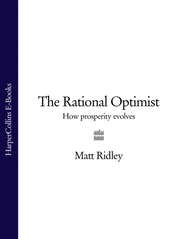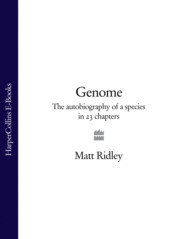По всем вопросам обращайтесь на: info@litportal.ru
(©) 2003-2024.
✖
Nature via Nurture: Genes, experience and what makes us human
Автор
Год написания книги
2019
Настройки чтения
Размер шрифта
Высота строк
Поля
Nature via Nurture: Genes, experience and what makes us human
Matt Ridley
Acclaimed author Matt Ridley's thrilling follow-up to his bestseller Genome. Armed with the extraordinary new discoveries about our genes, Ridley turns his attention to the nature versus nurture debate to bring the first popular account of the roots of human behaviour.What makes us who we are?In February 2001 it was announced that the genome contains not 100,000 genes as originally expected but only 30,000. This startling revision led some scientists to conclude that there are simply not enough human genes to account for all the different ways people behave: we must be made by nurture, not nature.Matt Ridley argues that the emerging truth is far more interesting than this myth. Nurture depends on genes, too, and genes need nurture. Genes not only predetermine the broad structure of the brain; they also absorb formative experiences, react to social cues and even run memory. They are consequences as well as causes of the will.Published fifty years after the discovery of the double helix of DNA, Nature via Nurture chronicles a new revolution in our understanding of genes. Ridley recounts the hundred years' war between the partisans of nature and nurture to explain how this paradoxical creature, the human being, can be simultaneously free-willed and motivated by instinct and culture. Nature via Nurture is an enthralling, up-to-the-minute account of how genes build brains to absorb experience.Note that it has not been possible to include the same picture content that appeared in the original print version.
Nature Via Nurture
Genes, Experience and What Makes Us Human
Matt Ridley
For Jim
Table of Contents
Cover Page (#u0693845d-660a-590b-8fc5-ae0ba180f14d)
Title Page (#ud13d534a-6a8e-5224-88a5-f77c022cae2a)
Dedication (#ud929bf50-6387-570d-8ac1-cbc486a88527)
PROLOGUE Twelve hairy men (#u3be845c5-4954-5e7e-bff0-adc4f280df85)
CHAPTER ONE The paragon of animals (#ub767e86a-dc35-52e1-9a7e-a19d06670d1f)
CHAPTER TWO A plethora of instincts (#u9e7629a1-ac63-57ef-b72f-bcfbc941e18d)
CHAPTER THREE A convenient jingle (#ua180f102-d82f-5c04-9564-7e3e9d3cdf5d)
CHAPTER FOUR The madness of causes (#litres_trial_promo)
CHAPTER FIVE Genes in the fourth dimension (#litres_trial_promo)
CHAPTER SIX Formative years (#litres_trial_promo)
CHAPTER SEVEN Learning lessons (#litres_trial_promo)
CHAPTER EIGHT Conundrums of culture (#litres_trial_promo)
CHAPTER NINE The seven meanings of ‘gene’ (#litres_trial_promo)
CHAPTER TEN A budget of paradoxical morals (#litres_trial_promo)
EPILOGUE Homo stramineus – the straw man (#litres_trial_promo)
Acknowledgements (#litres_trial_promo)
End Notes (#litres_trial_promo)
Index (#litres_trial_promo)
P.S. (#litres_trial_promo)
About the author (#litres_trial_promo)
Portrait (#litres_trial_promo)
Snapshot (#litres_trial_promo)
Life Drawing (#litres_trial_promo)
Top Ten Favourite Reads (#litres_trial_promo)
About the book (#litres_trial_promo)
A Critical Eye (#litres_trial_promo)
Love Actually (#litres_trial_promo)
Read on (#litres_trial_promo)
Have You Read? (#litres_trial_promo)
If You Loved This (#litres_trial_promo)
Find Out More (#litres_trial_promo)
About the Author (#litres_trial_promo)
By the same author (#litres_trial_promo)
Copyright (#litres_trial_promo)
About the Publisher (#litres_trial_promo)
PROLOGUE Twelve hairy men (#ulink_f6f9f03f-ed88-55f1-89e7-0e478eed9c78)
Perverse Mankind! Whose wills, created free,
Charge all their woes on absolute Decree;
All to the dooming Gods their guilt translate,
And follies are miscall’d the crimes of Fate.
Homer’s Odyssey, translated by Alexander Pope
(#litres_trial_promo)
‘Revealed: the secret of human behaviour,’ read the banner headline in the British Sunday newspaper the Observer on 11 February 2001. ‘Environment, not genes, key to our acts.’ The source of the story was Craig Venter, the self-made man of genes who had built a private company to read the full sequence of the human genome (his own) in competition with an international consortium funded by taxes and charities. That sequence – a string of three billion letters composed in a four-letter alphabet containing the complete recipe for building and running a human body – was to be published later in the week. The first analysis had revealed that there were just 30,000 genes in the human genome, not the 100,000 that many had been estimating up until a few months before.
Matt Ridley
Acclaimed author Matt Ridley's thrilling follow-up to his bestseller Genome. Armed with the extraordinary new discoveries about our genes, Ridley turns his attention to the nature versus nurture debate to bring the first popular account of the roots of human behaviour.What makes us who we are?In February 2001 it was announced that the genome contains not 100,000 genes as originally expected but only 30,000. This startling revision led some scientists to conclude that there are simply not enough human genes to account for all the different ways people behave: we must be made by nurture, not nature.Matt Ridley argues that the emerging truth is far more interesting than this myth. Nurture depends on genes, too, and genes need nurture. Genes not only predetermine the broad structure of the brain; they also absorb formative experiences, react to social cues and even run memory. They are consequences as well as causes of the will.Published fifty years after the discovery of the double helix of DNA, Nature via Nurture chronicles a new revolution in our understanding of genes. Ridley recounts the hundred years' war between the partisans of nature and nurture to explain how this paradoxical creature, the human being, can be simultaneously free-willed and motivated by instinct and culture. Nature via Nurture is an enthralling, up-to-the-minute account of how genes build brains to absorb experience.Note that it has not been possible to include the same picture content that appeared in the original print version.
Nature Via Nurture
Genes, Experience and What Makes Us Human
Matt Ridley
For Jim
Table of Contents
Cover Page (#u0693845d-660a-590b-8fc5-ae0ba180f14d)
Title Page (#ud13d534a-6a8e-5224-88a5-f77c022cae2a)
Dedication (#ud929bf50-6387-570d-8ac1-cbc486a88527)
PROLOGUE Twelve hairy men (#u3be845c5-4954-5e7e-bff0-adc4f280df85)
CHAPTER ONE The paragon of animals (#ub767e86a-dc35-52e1-9a7e-a19d06670d1f)
CHAPTER TWO A plethora of instincts (#u9e7629a1-ac63-57ef-b72f-bcfbc941e18d)
CHAPTER THREE A convenient jingle (#ua180f102-d82f-5c04-9564-7e3e9d3cdf5d)
CHAPTER FOUR The madness of causes (#litres_trial_promo)
CHAPTER FIVE Genes in the fourth dimension (#litres_trial_promo)
CHAPTER SIX Formative years (#litres_trial_promo)
CHAPTER SEVEN Learning lessons (#litres_trial_promo)
CHAPTER EIGHT Conundrums of culture (#litres_trial_promo)
CHAPTER NINE The seven meanings of ‘gene’ (#litres_trial_promo)
CHAPTER TEN A budget of paradoxical morals (#litres_trial_promo)
EPILOGUE Homo stramineus – the straw man (#litres_trial_promo)
Acknowledgements (#litres_trial_promo)
End Notes (#litres_trial_promo)
Index (#litres_trial_promo)
P.S. (#litres_trial_promo)
About the author (#litres_trial_promo)
Portrait (#litres_trial_promo)
Snapshot (#litres_trial_promo)
Life Drawing (#litres_trial_promo)
Top Ten Favourite Reads (#litres_trial_promo)
About the book (#litres_trial_promo)
A Critical Eye (#litres_trial_promo)
Love Actually (#litres_trial_promo)
Read on (#litres_trial_promo)
Have You Read? (#litres_trial_promo)
If You Loved This (#litres_trial_promo)
Find Out More (#litres_trial_promo)
About the Author (#litres_trial_promo)
By the same author (#litres_trial_promo)
Copyright (#litres_trial_promo)
About the Publisher (#litres_trial_promo)
PROLOGUE Twelve hairy men (#ulink_f6f9f03f-ed88-55f1-89e7-0e478eed9c78)
Perverse Mankind! Whose wills, created free,
Charge all their woes on absolute Decree;
All to the dooming Gods their guilt translate,
And follies are miscall’d the crimes of Fate.
Homer’s Odyssey, translated by Alexander Pope
(#litres_trial_promo)
‘Revealed: the secret of human behaviour,’ read the banner headline in the British Sunday newspaper the Observer on 11 February 2001. ‘Environment, not genes, key to our acts.’ The source of the story was Craig Venter, the self-made man of genes who had built a private company to read the full sequence of the human genome (his own) in competition with an international consortium funded by taxes and charities. That sequence – a string of three billion letters composed in a four-letter alphabet containing the complete recipe for building and running a human body – was to be published later in the week. The first analysis had revealed that there were just 30,000 genes in the human genome, not the 100,000 that many had been estimating up until a few months before.








